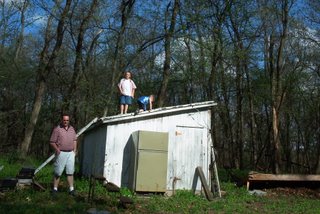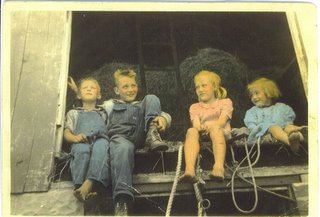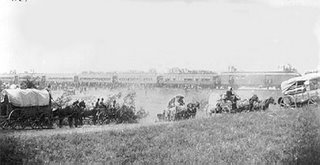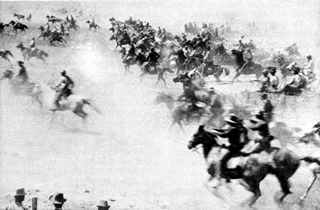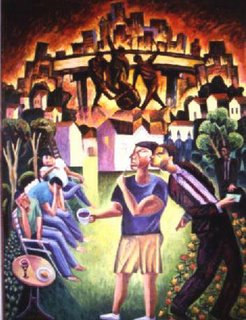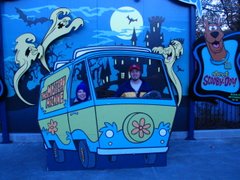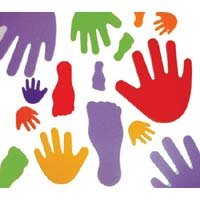
John 20:19-31
It was a crazy idea. That these very tiny little things -- invisible, in fact -- are the building blocks of the universe. Atoms! So tiny that they are indivisible. This would explain so many things, and yet because they are invisible there’s no way to prove it!
Believe it or not, this is what a crazy Greek man named Democritus conceived over 2400 years ago. Amazing that this man with no microscopes, no particle accelerators, no nano-technology, should come up with such an unbelievable idea. It would take 2000 years for such an idea to actually take hold in the minds of scientists and philosophers. But we believe it today . . . not so much because we’ve seen the atom ourselves, but because we’ve been told enough times and with the sufficient evidence to know that they exist.
Split one and we can cause the universe to collapse in on itself.
Evidence is really a hard thing. Evan and I love watching CSI – all three of them – Las Vegas, Miami, and New York. They pull little hairs out of carpet with tweezers, test white substances, boil bones. Juries convict on this stuff. It seems that the modern age does not require so much of a logical argument as much as it does good solid physical evidence. Stuff that we can see and touch and taste.
And we find our CSI’s at work here in this passage. For Thomas gives us a pretty understandable response when confronted with the suddenly fearless testimony of some previously very fearful disciples. Jesus had appeared to a shivering group of weary bleary followers. He showed them His hands and his side. He let them touch them. It still seemed like a dream. So when Thomas arrived, having missed the whole thing, you could understand his skepticism, right?
But now, poor Thomas, has been singled out. He sits right above Judas in the hierarchy of good disciples. We forget the disciples who were there were shown the same thing that Thomas demanded to see. Did they really ever have a faith any different than doubting Thomas?
Perhaps John is trying to tell us something here. Something besides a Jerry McGuire, “Show me the money!” kind of belief. A faith vomited up out of fear – fear of the Jews, fear of what is on the other side of the door, fear of death. They were all fearful. Thomas just said it out loud.
But Jesus’ response to Thomas, indeed to all the “believers,” was to let them poke into his side, and to stick their fingers into the holes and right out the other side. Jesus had the evidence that He was alive for those very people who had seen him die. Whether they should have needed it or not. It was His body itself, risen and glorified, that proclaimed the arrival of the Kingdom of God and redemption of all creation. They needed to see that because the world that is upside down had been turned right side up again.
Of course, Thomas’ response was the one of faith. He exclaims, “My Lord and my God!”
And Jesus does not deny him the recognition or the understanding.
An understanding not so much about what it was he was seeing but what it meant to see it.
For if Thomas hadn’t believed Jesus had been raised from the dead, how would he have believed the redemption fulfilled in this resurrection?
The commentator writes, “But belief itself comes from another source than evidence. It is a gift of God.”
Indeed, even our faith is something we can make up and work or will to ourselves. It is a gift we must receive only with fear and trembling. It is only formed in the moments we realize there is nothing else we can do to conjure it up, to squeeze it out. Only after enemies have left us defeated, and our efforts have left us worn out. When there nothing to have faith in . . .
I confess I am a doubter. Sometimes it’s not enough just to be told my God is faithful. That He does what He says He will do. I see His faithfulness in the lives of others – dreams fulfilled, plans carried out, redemption gained – I’m not always encouraged.
I read John’s words about why he wrote this story, “But these are written so that you may come to believe that Jesus is the Messiah, the Son of God, and that through believing you may have life in his name,” and I sense the struggle in these people.
I was not there on the hillside when Jesus fed the five thousand. I was not there when he calmed the storm. I was not there as he died on the cross. I did not wrap his body in strips of cloth. I did not hide in a dark room eluding the Jews. What evidence do I have that Jesus was and is who he says He is – the Son of God, the Son of Man, the Savior and Redeemer of the world?
I wonder where is this belief in my life? Where is God’s faithfulness? What is there to understand? Slogging through indecision, indifference, mediocrity, I’m looking for hands and feet, holes and marks and scars.
Science tells us that patterns of past behavior do not predict future behavior. Can this be true of God as well?
John writes to his beloved community and to us about what to do when we’re not seeing what we’re supposed to be believing.
And Jesus’ reproachful statement, “Have you believed because you have seen me? Blessed are those who have not seen and yet have come to believe,” is perhaps the beginning of that gift.
Our psalm concludes, “The fear of the LORD is the beginning of wisdom; all those who practice it have a good understanding.”
And in this Easter story we see certainly see fear. Fear of the Jews had lingered for days in the dark corners of their hiding places. They did not know what to believe. Jesus had told them what would happen, yet they still dreaded the knock on the door.
Jesus did not knock, but stood among them – literally breathing upon them his very presence. To touch his wounds meant no more fear and no more dealing. And doubting Thomas would be the first to proclaim what that presence meant – God with us.
He should be the one to remind us that it is the poor in spirit who inherit the Kingdom of God. Those who mourn will be comforted. Those who hunger who will be filled. Those who doubt will be met with scarred hands and wounded side.
What is understanding? Nothing that is not a gift of God. Do we come with faith to this Table? Should we, full of ourselves and our confident, nuanced, sophisticated faith? As if our faith is our backstage pass, our special clearance into these special rites and privileges.
Or may we come as Thomases with our eyes wide open in disbelief but our stomachs pained and growling ready to eat until we are filled?
I hope that we are not already there, that we might admit that we actually need Christ’s living breathing Spirit in our life and not our own hot air. Funny thing, Jesus knew then as He knows now, that we do need to get a grip on things sometimes. Let Him breathe upon us.
And today I invite you to this Table, to touch his broken body, and live again.
Julia, Word & Table Homily
